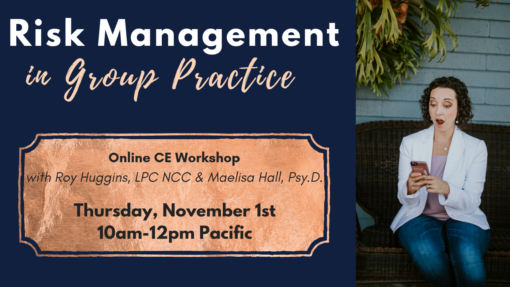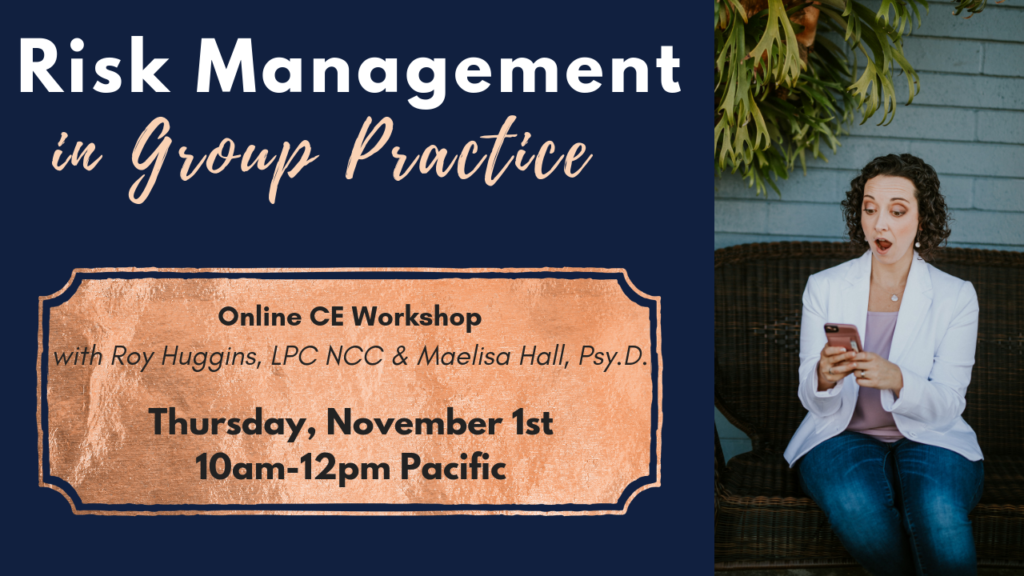Risk Management In Group Practice
2 CE Credit Hours. Legal-Ethical. Continuing Education Session Replay
Presented By: Roy Huggins LPC, NCC; Maelisa Hall, PsyD
Course Description

Running a group practice is exciting, fulfilling, and — hopefully — lucrative! There are challenges that come with the territory, though, including new risks that don’t show up when you only have to worry about yourself and your own practice.This introductory-level course for counselors, clinical social workers, marriage and family therapists, and clinical and counseling psychologists will help attendees identify the risks in their group practice related to documentation processes and to HIPAA Security compliance, and it will provide guidance on how to handle those risks.
Paperwork diva and quality assurance expert, Maelisa Hall PsyD, will teach attendees about managing the quality of documentation among group clinicians.
HIPAA security, technology, and telemental health expert, Roy Huggins LPC NCC, will talk about managing HIPAA-compliant security policies and procedures as well as the challenges and strategies for helping clinicians and staff comply with those legally-required documents.
The session will be fun, too, as Maelisa and Roy discuss these vital and information-packed topics with a positive, therapy-affirming attitude.
Educational Objectives
- Identify what forms of HIPAA Security policies and procedures are necessary for a group practice’s compliance
- Choose an employment structure that supports HIPAA Security compliance
- Identify a training program that can improve client care and reduce risk of liability
- Describe how to review client files and provide feedback to staff
Syllabus
- HIPAA Security Compliance Process Overview
- 3-step model of compliance
- Risk analysis
- Risk management and mitigation planning
- Security policies and procedures
- 3-step model of compliance
- Compliance for Group Practices
- How risk differs in a group vs. a solo practice
- Risk “surface area”
- “Bring your own device” and HIPAA compliance
- Security policy and procedure needs in a group vs. a solo practice
- HIPAA Security standards for workforce training and management
- How risk differs in a group vs. a solo practice
- Impact of Employment Law on HIPAA Compliance Strategies
- The eternal question: employees or contractors
- Can the practice enforce its HIPAA Security policies and procedures?
- Q&A
- Technology and Risk Management
- Paperwork and Risk Management
- Creating a training program that improves client care, reduces liability, and engages staff
- Have clear policies and procedures
- Use examples, samples and tech tools
- Work as a group and share mistakes
- Collect feedback and adjust on a regular basis
- Reviewing clients files and providing constructive feedback
- Use an objective tool to review notes and files
- Incorporate documentation into performance reviews
- Identify training needs and collaborate
- Creating a training program that improves client care, reduces liability, and engages staff
- Extended Q&A, next steps?
References
- Criteria for the Evaluation of Quality Improvement Programs and the Use of Quality Improvement Data, American Psychological Association, American Psychologist. 2009. September Vol 64 Number 6, Pages 551-557.
- Luepker, E.T. (2012) Record Keeping in Psychotherapy and Counseling. New York, NY: Routledge.
- Reamer, Frederic G., “Social Work in a Digital Age: Ethical and Risk Management Challenges” (2013). Faculty Publications. 391. https://digitalcommons.ric.edu/facultypublications/391
- Reamer, F. (2001). The Social Work Ethics Audit: A Risk-management Tool. (Washington, DC: NASW Press).
- Schwitzer, A.M. & Rubin, L.C. (2015) Diagnosis & Treatment Planning Skills. Thousand Oaks, CA: SAGE Publishing.
- US Dept. of Health and Human Services. (2006). HIPAA Administrative Simplification . Washington, DC: Author.
- US Dept. of Health and Human Services. (2013). HIPAA Omnibus Final Rule . Washington, DC: Author.
- Wiger, D.E. (2012) The Psychotherapy Documentation Primer, 3rd Edition. Hoboken, NJ: John Wiley & Sons, Inc.
- Zuckerman, E.L. & Kolmes, K. (2016). The Paper Office for the Digital Age, 5th Edition. New York, NY: The Guilford Press.
Presented/Developed By
 Maelisa Hall, PsyD, Dr. Maelisa Hall is a licensed psychologist, wife, nail design enthusiast and co-host of the My Biz Bestie podcast. Through her online continuing education business, QA Prep, she specializes in teaching therapists how to connect with their paperwork so it’s more simple and more meaningful. She enjoys creating trainings that are interactive and engaging so that clinicians leave with strategies they can use immediately.
Maelisa Hall, PsyD, Dr. Maelisa Hall is a licensed psychologist, wife, nail design enthusiast and co-host of the My Biz Bestie podcast. Through her online continuing education business, QA Prep, she specializes in teaching therapists how to connect with their paperwork so it’s more simple and more meaningful. She enjoys creating trainings that are interactive and engaging so that clinicians leave with strategies they can use immediately.
Maelisa’s love of collaboration means that she is always networking and focuses on resources for the mental health community. Her love of online marketing means that she is constantly sharing these resources and staying up to date on latest trends, which she manages to do while living on a sailboat in Southern California.
 Roy Huggins, LPC NCC, is a counselor in private practice who also directs Person-Centered Tech. Roy worked as a professional Web developer for 7 years before changing paths, and makes it his mission to grow clinicians’ understanding of the Internet and other electronic communications mediums for the future of our practices and our professions.
Roy Huggins, LPC NCC, is a counselor in private practice who also directs Person-Centered Tech. Roy worked as a professional Web developer for 7 years before changing paths, and makes it his mission to grow clinicians’ understanding of the Internet and other electronic communications mediums for the future of our practices and our professions.
Roy is an adjunct instructor at the Portland State University Counseling program where he teaches Ethics, and is a member of the Zur Institute advisory board. He has acted as a subject matter expert on HIPAA, security and clinical use of technology for Counseling licensure boards and both state and national mental health professional organizations. He has co-authored or authored 2 book chapters, and he routinely consults with mental health colleagues on ethical and practical issues surrounding tech in clinical practice. He served for 5 years on the board of the Oregon Mental Health Counselors Association and then the Oregon Counseling Association as the Technology Committee Chair.
He really likes this stuff.
Program Notices
Accuracy, Utility, and Risks Statement: Some interpretation and analysis presented is made by the presenters based on professional work experience, research of literature, and publications from the federal Department of Health and Human Services. The program may not include information on all applicable state or federal laws. Misapplication of the materials, or errors in the materials, could result in delays or other issues related to insurance payments or contracts, security problems, data breaches, or non-compliance with applicable laws or ethics codes.
Conflicts of Interest: None.
Commercial Support: None.
This course is subject to our cancellation/refund policy and complaint policy.

